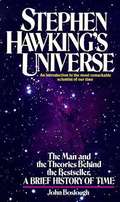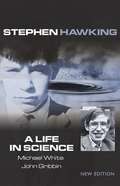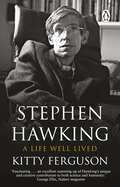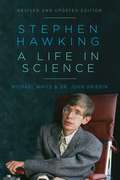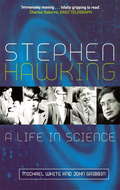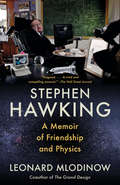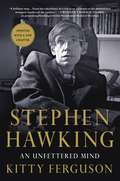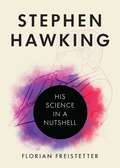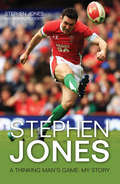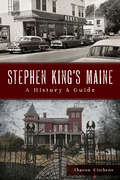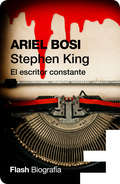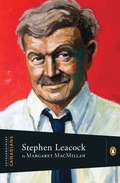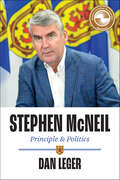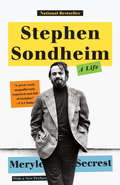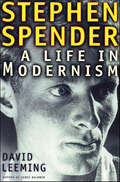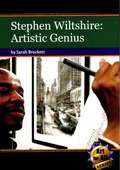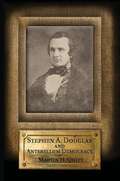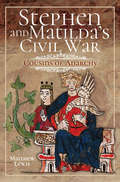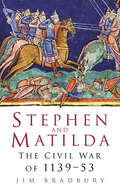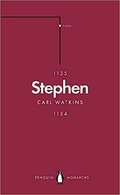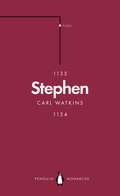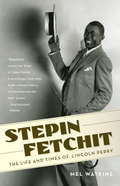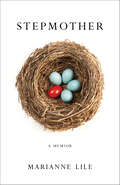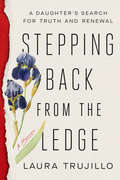- Table View
- List View
Stephen Hawking's Universe: An Introduction to the Most Remarkable Scientist of Our Time
by John BosloughSince the publication of "A Brief History of Time" - an introduction to some of the most important theories on the cosmos - Stephen Hawking is known widely as a man who has changed the way we look at the universe. He became a member of the Royal Society at the unusually early age of 32 and became in 1980 Lucasian Professor of Mathematics at Cambridge University. Written with Hawking's assistance, this is a readable account for the non-specialist of his contribution to theoretical physics. It encompasses his theories on the Big Bang and the nature of black holes, and contains the transcript of one of his most important essays.
Stephen Hawking: A Life In Science
by Michael White John GribbinOriginally published in 1992 to great acclaim, this updated edition traces the course of Hawking’s life and science, successfully marrying biography and physics to tell the story of a remarkable man. Stephen Hawking is no ordinary scientist. With a career that began over thirty years ago at Cambridge University, he has managed to do more than perhaps any other scientist to broaden our basic understanding of the universe. His theoretical work on black holes and his progress in advancing our knowledge of the origin and nature of the cosmos have been groundbreaking—if not downright revolutionary. Stephen Hawking has also spent much of his adult life confined to a wheelchair, a victim of ALS, a degenerative motor neuron disease. Clearly his physical limitations have done nothing to confine him intellectually. He simply never allowed his illness to hinder his scientific development. In fact, many would argue that his liberation from the routine chores of life has allowed him to focus his efforts more keenly on his science. Hawking certainly would have been remarkable for his cutting edge work in theoretical physics alone. However, he has also managed to popularize science in a way unparalleled by other scientists of his stature. He became a household name, achieving almost cult-like fame, with the release of his best-selling book, A Brief History of Time. Although steeped in the potentially overwhelming complexities of cosmology, he succeeded in selling millions of copies to audiences eager to learn even some of what he has to offer. Science writers White and Gribbin have skillfully painted a portrait of an indefatigable genius and a scientific mind that seemingly knows no bounds. Knitting together clear explanations of Hawking’s science with a detailed personal history that is both balanced as well as sensitive, we come to know—and appreciate—both. As Stephen Hawking’s new book, The Universe in a Nutshell, hits the best-seller lists, it is the ideal time for readers to learn more about this remarkable man and his vast body of accomplishments.
Stephen Hawking: A Life Well Lived
by Kitty FergusonIn 1963 Stephen Hawking was given two years to live. Defying all the odds, he died in March 2018 at age seventy-six as the most celebrated scientist in the world. This carefully researched and updated biography and tribute gives a rich picture of Hawking's remarkable life - his childhood, the heart-rending beginning of his struggle with motor neurone disease, his ever-increasing international fame, and his long personal battle for survival in pursuit of a scientific understanding of the universe. From more recent years, Kitty Ferguson describes his inspiring leadership at the London Paralympic Games, the release of the film The Theory of Everything, his continuing work on black holes and the origin of the universe, the discovery of 'supertranslations', and the astounding 'Starshot' program. Here also are his intense concern for the future of the Earth and his use of his celebrity to fight for environmental and humanitarian causes, and, finally, a ground-breaking paper he was working on at the time of his death, in which he took issue with some of his own earlier theories. Throughout, Ferguson summarizes and explains the cutting-edge science in which Hawking was engaged and offers vivid first-hand descriptions of his funeral in Cambridge and the interment of his ashes in Westminster Abbey. This is an amazing and revealing tribute, assessing Hawking's legacy in and out of science.
Stephen Hawking: A Life in Science
by Michael White John GribbinAn updated edition of the definitive biography on Stephen Hawking that marries biography and science to tell the story of one of the most remarkable men in history Stephen Hawking is no ordinary scientist. He has broadened our basic understanding of the universe and his theoretical work on black holes and the origins of the cosmos have been groundbreaking, if not downright revolutionary. He has also spent much of his adult life confined to a wheelchair, a victim of ALS. But his physical limitations have done nothing to confine him intellectually. Hawking would already be remarkable for his cutting-edge work in theoretical physics alone. However, he has also managed to popularize science unlike anyone else. He achieved almost cult-like fame with his A Brief History of Time and has since become a household name by making the complexities of cosmology accessible to millions of people. In Stephen Hawking, science writers White and Gribbin have painted a compelling portrait of a scientific mind that seemingly knows no bounds. Weaving together clear explanations of Hawking’s science with a detailed, balanced, and sensitive personal history, readers will come to know and appreciate both sides of this incredible man. Includes new updates in Hawking’s biography and the recent discovery of the Higgs-Boson (or “God”) particle.
Stephen Hawking: A Life in Science
by Michael White John Gribbin'A gripping account of a physicist whose speculations could prove as revolutionary as those of Albert Einstein . . . Its combination of erudition, warmth, robustness, and wit is entirely appropriate to their subject' New Statesman'Intriguing . . . There are larger questions here than the life of even this singular man' Peter Ackroyd, The TimesStephen Hawking was no ordinary scientist. He managed to do more than perhaps any other physicist to broaden our basic understanding of the universe. This skilful portrait of an indefatigable genius traces the course of Hawking's life and science, marrying biography and physics to tell the story of a remarkable man.
Stephen Hawking: A Life in Science, Updated New Edition
by Michael White John GribbinOriginally published in 1992 to great acclaim, this updated edition traces the course of Hawking’s life and science, successfully marrying biography and physics to tell the story of a remarkable man.<P> Stephen Hawking is no ordinary scientist. With a career that began over thirty years ago at Cambridge University, he has managed to do more than perhaps any other scientist to broaden our basic understanding of the universe. His theoretical work on black holes and his progress in advancing our knowledge of the origin and nature of the cosmos have been groundbreaking—if not downright revolutionary.<P> Stephen Hawking has also spent much of his adult life confined to a wheelchair, a victim of ALS, a degenerative motor neuron disease. Clearly his physical limitations have done nothing to confine him intellectually. He simply never allowed his illness to hinder his scientific development. In fact, many would argue that his liberation from the routine chores of life has allowed him to focus his efforts more keenly on his science.<P> Hawking certainly would have been remarkable for his cutting edge work in theoretical physics alone. However, he has also managed to popularize science in a way unparalleled by other scientists of his stature. He became a household name, achieving almost cult-like fame, with the release of his best-selling book, A Brief History of Time. Although steeped in the potentially overwhelming complexities of cosmology, he succeeded in selling millions of copies to audiences eager to learn even some of what he has to offer.<P> Science writers White and Gribbin have skillfully painted a portrait of an indefatigable genius and a scientific mind that seemingly knows no bounds. Knitting together clear explanations of Hawking’s science with a detailed personal history that is both balanced as well as sensitive, we come to know—and appreciate—both.<P> As Stephen Hawking’s new book, The Universe in a Nutshell, hits the best-seller lists, it is the ideal time for readers to learn more about this remarkable man and his vast body of accomplishments.
Stephen Hawking: A Memoir of Friendship and Physics
by Leonard MlodinowAn intimate and inspirational exploration of Stephen Hawking—the man, the friend, and the physicist.One of the most influential physicists of our time, Stephen Hawking touched the lives of millions. Recalling his nearly two decades as Hawking&’s collaborator and friends, Leonard Mlodinow brings this complex man into focus in a unique and deeply personal portrayal. We meet Hawking the genius, who ours his mind into uncovering the mysteries of the universe—ultimately formulating a pathbreaking theory of black holes that reignites the discipline of cosmology and paves the way for physicists to investigate the origins of the universe in completely new ways. We meet Hawking the colleagues, a man whose illness leaves him able to communicate at only six words per minute but who expends the effort to punctuate his conversations with humor. And we meet Hawking the friend, who can convey volumes with a frown, a smile, or simply a raised eyebrow. Mlodinow puts us in the room as Hawking indulges his passion for wine and curry; shares his feelings on love, death, and disability; and grapples with deep questions of philosophy and physics. Whether depicting Hawking&’s devotion to his work or demonstrating how he would make spur of the moment choices, such as punting on the River Cam (despite the risk the jaunt to posed), or spinning tales of Hawking defiantly urinating in the hedges outside a restaurant that doesn&’t have a wheelchair accessible toilet, Mlodinow captures his indomitable spirit. This deeply affecting account of a friendship teaches us not just about the nature and practice of physics but also about life and the human capacity to overcome daunting obstacles.
Stephen Hawking: An Unfettered Mind (Ciencia Y Tecnología Ser.)
by Kitty FergusonKitty Ferguson, the award-winning and international bestselling author of Stephen Hawking’s biography, presents an even deeper portrait of the legendary physicist’s life and scientific theories.This updated edition of Stephen Hawking: An Unfettered Mind looks at one of the most remarkable figures of our age: the bestselling author of A Brief History of Time, celebrated theoretical physicist, and an inspiration to millions around the world. Ferguson offers fresh insights into the way Hawking thinks and works, his ever-more-imaginative adventures in science at the “flaming ramparts of the world,” the discovery of gravity waves, the blockbuster proposal for “Starshot” to explore the cosmos, and his powerful use of his celebrity on behalf of human rights and survival on earth and beyond.With rare access to Hawking, including childhood photos and in-depth research, Ferguson creates a rich and comprehensive picture of his life: his childhood; the heartbreaking ALS diagnosis when he was a first-year graduate student; his long personal battle for survival in pursuit of a scientific understanding of the universe; and his rise to international fame. She also uses her gift for translating the language of theoretical physics into the language of the rest of us to make Hawking’s scientific work accessible.This is an insightful, absorbing, and definitive account of a brilliant mind and the extraordinary life of a man who always looks towards tomorrow.
Stephen Hawking: His Science in a Nutshell
by Florian FreistetterA science writer explains the significance of Stephen Hawking's work—in terms all of us can understand.Stephen Hawking was one of the most important astrophysicists of the last fifty years. After the publication of A Brief History of Time, he became an international celebrity. Though the book sold in the millions, few readers really grasped the significance of his groundbreaking work. Now popular Austrian science blogger Florian Freistetter, himself an astronomer, makes Hawking's contributions accessible to everyday readers in this concise, very readable book.By focusing on the essentials, Freistetter deftly and entertainingly makes Hawking's complex theoretical accomplishments understandable. Avoiding technicalities and jargon, he elucidates the great scientist's fascinating work on black holes, gravitational waves, the big bang, and singularities. Concluding with an appreciation of Hawking as a science communicator and popularizer, Freistetter conveys the importance of Hawking's scientific research in terms that nonspecialists can follow.
Stephen Jones: A Thinking Man's Game: My Story
by Stephen Jones Simon RobertsSince making his national debut in 1998, Stephen Jones has emerged from the shadows of the true greats of Welsh rugby, such as Barry John, Phil Bennett, Jonathan Davies and Neil Jenkins, to make the fly-half position his own. In this revealing autobiography, he provides a rare insight into the demands and pressures of wearing the almost mythical number 10 jersey that has such a pre-eminent status in the Welsh psyche.As well as playing an integral role in Wales's two Grand Slam victories, Jones has appeared in three Rugby World Cups and was part of the 2005 British and Irish Lions squad. He has witnessed at first hand how the Welsh rugby establishment has struggled with the transition to professionalism, and in this candid memoir he recounts the many highs he has experienced, as well as the challenges he has faced, throughout his career so far.Jones gives an intriguing account of how he became one of the few Welsh players to play in France, recalling the brutality of the game there and how he became a cult figure amongst fans of Clermont Auvergne, where he was twice voted fly-half of the season.In Stephen Jones - A Thinking Man's Game: My Story, the Welsh rugby star reveals how his steely resolve, utter determination and sheer passion for rugby have allowed him to bounce back from numerous setbacks to become one of the most popular and respected figures in the game today.
Stephen King's Maine: A History & Guide (History & Guide)
by Sharon KitchensMuch of Western Maine reads like a Stephen King novel. The dense dark woods and backcountry ponds. The century-old houses with gravel driveways and immense flower gardens, acres of farmland miles from a highway. Serpentine country roads dotted with farmstands, and picturesque main streets lined with battered pickups. Places where-especially during the dark and rainy days of October and November--things can get downright spooky. Author Sharon Kitchens identifies the locations that serve as the basis for King's fictional towns of Castle Rock, Jerusalem's Lot, Derry, and Haven. Drawing on historical materials and conversations with locals and people who know King, the author sheds light on daily life in places that would become the settings for Carrie, Salem's Lot, The Dead Zone, Cujo , IT , and 11/22/63 .
Stephen King: El escritor constante
by Ariel BosiUna interesante introducción a la vida y obra del maestro del horror. De la mano de Ariel Bosi, uno de los mayores expertos en la vida y obra del Rey de Reyes, conocerás los inicios como escritor de Stephen King, sus muchos fracasos, sus penurias económicas y sus principales logros como autor; los cimientos que le convirtieron en el más importante escritor vivo de literatura de terror. «Hora soy escritor. Muchísimos críticos creen que lo que escribo es una mierda [...] Mi historia se parece tantísimo a un cuento de hadas que resulta absurda.»Stephen King, El cuerpo
Stephen Leacock
by Margaret MacmillanIn 1912, Stephen Leacock's comic masterpiece Sunshine Sketches of a Little Town made him an international star overnight. He was published in magazines and newspapers across Canada and in New York and London. Charlie Chaplin asked him for a screenplay; a young F. Scott Fitzgerald expressed his admiration. Eminent historian Margaret MacMillan argues that, while much of what Leacock satirized in small-town Canada has disappeared, his humour endures. His skewering of pretension and his self-deprecating wit entertained thousands during his heyday, even as it defined a quintessentially Canadian stance. But Leacock, MacMillan points out, was also a public intellectual, engaged with questions about government, war, and a just society. Writing with her usual brio, MacMillan has created a wonderfully insightful and affectionate portrait of a man who mattered.
Stephen McNeil: Principle and Politics
by Dan LegerIn today’s moralistic politics, to differ is to sin. But Stephen McNeil actually was different; he willingly committed the political sin of valuing principle over popularity. Premier of Nova Scotia for seven years, through elections, unrest, danger, and even tragedy, McNeil was determined to govern by putting principle first. Not everyone agreed with him or his priorities, but he accepted that because he was in politics for reasons other than the quest for power and the need to keep it. In Stephen McNeil: Principle and Politics, award-winning journalist and author Dan Leger argues that McNeil’s name should be there when we talk about premiers of consequence. With twenty black and white photos and a full-colour photo insert, Stephen McNeil: Principle and Politics tells the previously untold inside story of McNeil’s eventful career in politics. Through exclusive interviews with political insiders and with McNeil himself, Leger reveals that, like him or not, Stephen McNeil has had a lasting impact on the lives of Nova Scotians.
Stephen Sondheim: A Life
by Meryle SecrestIn the first full-scale life of the most important composer-lyricist at work in musical theatre today, Meryle Secrest, the biographer of Frank Lloyd Wright and Leonard Bernstein, draws on her extended conversations with Stephen Sondheim as well as on her interviews with his friends, family, collaborators, and lovers to bring us not only the artist--as a master of modernist compositional style--but also the private man. Beginning with his early childhood on New York's prosperous Upper West Side, Secrest describes how Sondheim was taught to play the piano by his father, a successful dress manufacturer and amateur musician. She writes about Sondheim's early ambition to become a concert pianist, about the effect on him of his parents' divorce when he was ten, about his years in military and private schools. She writes about his feelings of loneliness and abandonment, about the refuge he found in the home of Oscar and Dorothy Hammerstein, and his determination to become just like Oscar.Secrest describes the years when Sondheim was struggling to gain a foothold in the theatre, his attempts at scriptwriting (in his early twenties in Rome on the set of Beat the Devil with Bogart and Huston, and later in Hollywood as a co-writer with George Oppenheimer for the TV series Topper), living the Hollywood life.Here is Sondheim's ascent to the peaks of the Broadway musical, from his chance meeting with play-wright Arthur Laurents, which led to his first success--as co-lyricist with Leonard Bernstein on West Side Story--to his collaboration with Laurents on Gypsy, to his first full Broadway score, A Funny Thing Happened on the Way to the Forum. And Secrest writes about his first big success as composer, lyricist, writer in the 1960s with Company, an innovative and sophisticated musical that examined marriage à la mode. It was the start of an almost-twenty-year collaboration with producer and director Hal Prince that resulted in such shows as Follies, Pacific Overtures, Sweeney Todd, and A Little Night Music.We see Sondheim at work with composers, producers, directors, co-writers, actors, the greats of his time and ours, among them Leonard Bernstein, Ethel Merman, Richard Rodgers, Oscar Hammerstein, Jerome Robbins, Zero Mostel, Bernadette Peters, and Lee Remick (with whom it was said he was in love, and she with him), as Secrest vividly re-creates the energy, the passion, the despair, the excitement, the genius, that went into the making of show after Sondheim show.A biography that is sure to become the standard work on Sondheim's life and art.
Stephen Spender: A Life in Modernism
by David LeemingThe first critical biography of one of the twentieth century's towering literary figures.Stephen Spender was a minor poet, but a major cultural influence during much of the century. Literary critic, journalist, art critic, social commentator, and friendend of the best-known cultural figures of the modernist and postmodernist periods (Yeats, Woolf, Sartre, Auden, Eliot, Isherwood, Hughes, Brodsky, Ginsberg-a "who's who" of contemporary literature). Spender's writing recorded and distilled the emotional turbulence of many of the century's defining moments: the Spanish Civil War; the rise and fall of Marxism and Nazism; World War II; the human rights struggle after the war; the Vietnam protest, the Cold War, and the 1960s sexual revolution; the rise of America as a cultural and political force. As David Leeming's fascinating biography demonstrates, Stephen Spender's life reflected the complexity and flux of the century in which he lived: his sexual ambivalence, his famous friends, the free-love days in Germany between the wars, the CIA-Encounter scandal. In David Leeming's capable hands, this comprehensive, unauthorized study of Spender is a meditation on modernity itself.
Stephen Wiltshire: Artistic Genius (Fountas & Pinnell LLI Purple #Level R)
by Sarah BrockettStephen Wiltshire: Artistic Genius by Sarah Brockett
Stephen a. Douglas and Antebellum Democracy
by Martin H. QuittThis thematic biography demonstrates how Stephen Douglas's path from a conflicted youth in Vermont to dim prospects in New York to overnight stardom in Illinois led to his identification with the Democratic Party and his belief that the federal government should respect the diversity of states and territories. His relationships with his mother, sister, teachers, brothers-in-law, other men and two wives are explored in depth. When he conducted the first cross-country campaign by a presidential candidate in American history, few among the hundreds of thousands that saw him in 1860 knew that his wife and he had just lost their infant daughter or that Douglas controlled a large Mississippi slave plantation. His story illuminates the gap between democracy then and today. The book draws on a variety of previously unexamined sources.
Stephen and Matilda's Civil War: Cousins of Anarchy
by Matthew LewisThe story of the twelfth-century rivalry for the throne between the daughter and the nephew of Henry I—a battle that tore England apart for over a decade.The Anarchy was the first civil war in post-Conquest England, enduring throughout the reign of King Stephen between 1135 and 1154. It ultimately brought about the end of the Norman dynasty and the birth of the mighty Plantagenet kings. When Henry I died having lost his only legitimate son in a shipwreck, his barons had sworn to recognize his daughter Matilda, widow of the Holy Roman Emperor, as his heir, and remarried her to Geoffrey, Count of Anjou. But when she was slow to move to England upon her father’s death, Henry’s favorite nephew, Stephen of Blois, rushed to have himself crowned, much as Henry himself had done on the death of his brother William Rufus.Supported by his brother Henry, Bishop of Winchester, Stephen made a promising start, but Matilda would not give up her birthright and tried to hold the English barons to their oaths. The result was more than a decade of civil war that saw England split apart. Empress Matilda is often remembered as aloof and high-handed, Stephen as ineffective and indecisive. By following both sides of the dispute and seeking to understand their actions and motivations, Matthew Lewis aims to reach a more rounded understanding of this crucial period of English history—and ask to what extent there really was anarchy.
Stephen and Matilda: The Civil War of 1139-53
by Jim BradburyStephen's reign was one of the darkest periods of English history. He had promised Henry I that he would support the king's daughter, Matilda, as the rightful heir to the English throne, but when Henry dies in December 1135 he broke his promise and quickly made himself king. Like many of the nobles, he was unwilling to yield the crown to a woman. Civil wars and the battle for the English Crown dominated his reign, and this fascinating book examines the conflict between Stephen and his cousin. The campaigns, battles and sieges of England's first civil war are explored, including the two major battles at the Standard adn Lincoln, which show that Stephen always held more ground than his opponents and was mostly on the offensive. The two sides finally reached a compromise, after 14 years, with the Treaty of Wallingford - Stephen would rule unopposed until his death but the throne would then pass to Henry of Anjou, Matilda's son. Full of colourful characters, this is a fascinating story of rivalry for the English throne which throws new light on a neglected aspect of Stephen's reign.
Stephen: The Reign Of Anarchy (Penguin Monarchs Ser.)
by Carl WatkinsKnown as 'the anarchy', the reign of Stephen (1135-1141) saw England plunged into a civil war that illuminated the fatal flaw in the powerful Norman monarchy, that without clear rules ordering succession, conflict between members of William the Conqueror's family were inevitable. But there was another problem, too: Stephen himself. With the nobility of England and Normandy anxious about the prospect of a world without the tough love of the old king Henry I, Stephen styled himself a political panacea, promising strength without oppression. As external threats and internal resistance to his rule accumulated, it was a promise he was unable to keep. Unable to transcend his flawed claim to the throne, and to make the transition from nobleman to king, Stephen's actions betrayed uneasiness in his role, his royal voice never quite ringing true. The resulting violence that spread throughout England was not, or not only, the work of bloodthirsty men on the make. As Watkins shows in this resonant portrait, it arose because great men struggled to navigate a new and turbulent kind of politics that arose when the king was in eclipse.
Stephen: The Reign of Anarchy (Penguin Monarchs)
by Carl WatkinsKnown as 'the anarchy', the reign of Stephen (1135-1141) saw England plunged into a civil war that illuminated the fatal flaw in the powerful Norman monarchy, that without clear rules ordering succession, conflict between members of William the Conqueror's family were inevitable. But there was another problem, too: Stephen himself.With the nobility of England and Normandy anxious about the prospect of a world without the tough love of the old king Henry I, Stephen styled himself a political panacea, promising strength without oppression. As external threats and internal resistance to his rule accumulated, it was a promise he was unable to keep. Unable to transcend his flawed claim to the throne, and to make the transition from nobleman to king, Stephen's actions betrayed uneasiness in his role, his royal voice never quite ringing true.The resulting violence that spread throughout England was not, or not only, the work of bloodthirsty men on the make. As Watkins shows in this resonant new portrait, it arose because great men struggled to navigate a new and turbulent kind of politics that arose when the king was in eclipse.
Stepin Fetchit: The Life and Times of Lincoln Perry
by Mel WatkinsThe first African American movie star, Lincoln Perry, a. k. a. Stepin Fetchit, is an iconic figure in the history of American popular culture. In the late 1920s and ’30s he was both renowned and reviled for his surrealistic portrayals of the era’s most popular comic stereotype—the lazy, shiftless Negro. After his breakthrough role in the 1929 film Hearts in Dixie, Perry was hailed as “the best actor that the talking pictures have produced” by the critic Robert Benchley. Having run away from his Key West home in his early teens, Perry found success as a vaude- villian before making his way to California. The tall, lanky actor became the first millionaire black movie star when he appeared in a string of hit movies as the whiny, ever-perplexed, slow-talking comic sidekick. Perry was the highest paid and most popular black comedian in America during Hollywood’s Golden Age, but his ongoing battles with movie executives, his rowdy offscreen behavior, and his extravagant spending kept him in gossip-column headlines. Perry’s spendthrift ways and exorbitant lifestyle hastened his decline and, in 1947, having squandered or given away his fortune, he was forced to declare bankruptcy. In 1964 Perry was discovered in the charity ward of Chicago’s Cook County Hospital; he later turned up in Muhammad Ali’s entourage. In 1972 he unsuccessfully sued CBS for defamation because of a television program that ridiculed the type of characters he had portrayed. But his achievements were eventually acknowledged: in 1976 the Hollywood chapter of the NAACP gave him its Special Image Award for having opened the door for many a succeeding African American film star, and in 1978 he was inducted into the Black Filmmakers Hall of Fame. In Stepin Fetchit, Mel Watkins has given us the first definitive, full-scale biography of an entertainment legend.
Stepmother: A Memoir
by Marianne LileStepmother tells the story of Marianne Lile, who met a man, fell in love, got married, and arrived home from the honeymoon with a new label: stepmom. It was a role she initially embraced—but she quickly discovered she was alone in a difficult situation, with no handbook and no mentor. Here, Lile describes the complexities of the stepmom position, in a family and in the community, and shares her experience wearing a tag that is often misunderstood and weighed down by the numerous myths in society. Candid and poignant, Stepmother is a story of love and like, resentments and exasperation, resignation and hope—and a story, ultimately, of family.
Stepping Back from the Ledge: A Daughter's Search for Truth and Renewal
by Laura TrujilloIn this stunning memoir of grief and survival, one woman confronts her family&’s secrets in the aftermath of her mother&’s suicide, asking a seemingly impossible question: How do you mourn a loved one as you repair the injuries they inflicted?&“Laura Trujillo resurfaces from the dark &‘sub-basement&’ of despair with assurances for us all: There is hope. There is healing. Always, there is love. This book will save lives.&”—Connie Schultz, author of The Daughters of ErietownLaura Trujillo had been close to her mother for most of her adult life, raising her four children within a few miles of their beloved grandmother&’s Phoenix home. But just three months after moving her young family to Cincinnati for a new job, Laura receives shocking news: Her mother had taken her own life—by jumping off a ledge into the Grand Canyon, a place Laura knew her mother had always loved. Laura and her mother had shared a profound and special bond, yet each had also kept from the other the deepest truths about their lives. As an adult, Laura finally broke her silence about the sexual abuse she had suffered as a teenager at the hands of her stepfather—a secret Laura had buried to protect her mother. After her mother&’s death, Laura embarks on an emotional odyssey, searching for clues that could explain the depression, intergenerational trauma, and shared heartbreaks in her family. When she returns to the Grand Canyon, it becomes an oasis that nurtures Laura&’s search for redemption and peace. As Laura wrestles with her feelings, she forges a new path forward. Moving and intimate, powerfully told, Stepping Back from the Ledge is a remarkable exploration of the bond between a mother and daughter, and of the hope that can come from facing the truth.
